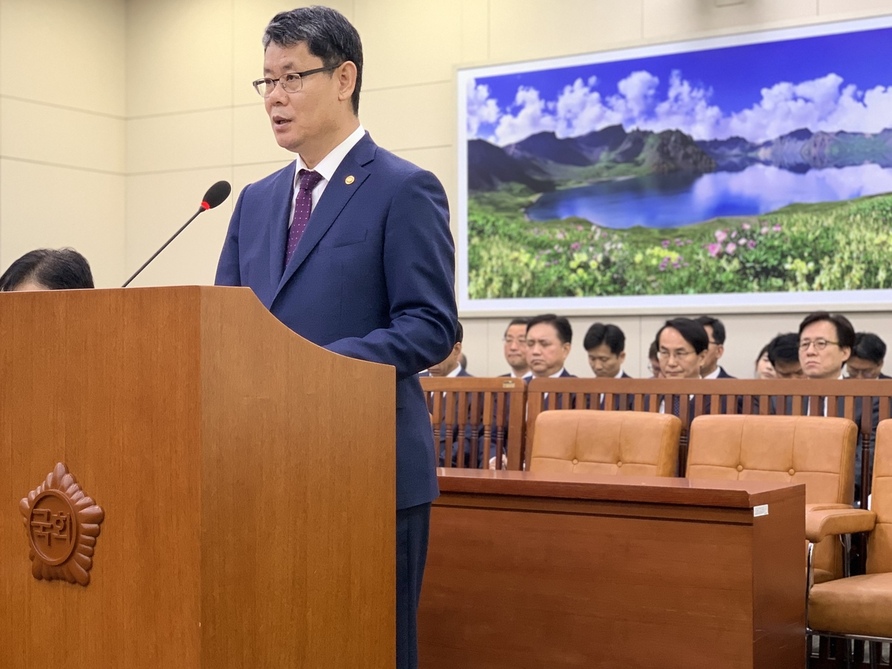 |
|
South Korean Unification Minister Kim Yeon-chul speaks during an audit by the National Assembly’s Foreign Affairs and Unification Committee on Oct. 17.
|
Kim Yeon-chul attends Ntl. Assembly Foreign Affairs and Unification Committee audit
South Korean Unification Minister Kim Yeon-chul said it was “too bad” and “disappointing” that a football match between the South and North Korean teams in Pyongyang on Oct. 15 wasn’t broadcast and that no fans or cheerleaders were even allowed into the stands. That was how Kim responded to remarks by Democratic Party lawmaker Park Byeong-seok while attending an audit by the National Assembly’s Foreign Affairs and Unification Committee on Oct. 17. “The broadcasting rights for regional qualifiers are held by the host country [in this case, North Korea], while the rights for the main qualifiers are held by the Asian Football Confederation and the rights for the World Cup are held by FIFA,” Kim said when asked about the game. “What happened is that North Korea forfeited the money they would have made via broadcasting fees and admission, and there appear to have been several reasons for that. One is the stalemate in inter-Korean relations; it can also be seen as an attempt at impartiality since [South Korean] cheerleaders weren’t being admitted.” Kim was saying that the complete absence of fans in the stadium may have resulted from the North Korean government’s attempt at equity: since South Korean fans and cheerleaders weren’t allowed to attend the game, North Korean fans weren’t let in either. “I think it’s really too bad that the public’s hopes were dashed like this,” Kim added. During the same parliamentary audit, Democratic Party lawmaker Choo Mi-ae brought up the fact that humanitarian aid — which is supposed to be exempted from sanctions — is being obstructed by sanctions on North Korea. Kim offered the following response: “The UN sanctions on North Korea make an exception for humanitarian aid. As [Choo] pointed out, we face a dilemma in which [humanitarian aid] projects are exempted from the sanctions but those same projects are stalled during the process of getting [exemptions for] the [aid] supplies. The very system of sanctions exemptions is functioning as an obstacle to humanitarian cooperation.” In contrast with international organizations, Kim said, “the Unification Ministry is considering how to deal with the issue of monitoring domestic NGOs’ aid to N. Korea” when providing humanitarian aid to the North to ensure transparency. On Thursday, Kim also offered an explanation for why no agreement was reached in the North Korea-US working-level negotiations in Stockholm on Oct. 4-5. “What I’m told is that [North Korea and the US] discussed the four points agreed upon at Singapore. Considering how long it would take to deliberate how to reach those goals and how to maintain balance on each of them under the current circumstances, I suspect there wasn’t enough time for a detailed discussion [about that],” he said. By Noh Ji-won, staff reporter Please direct comments or questions to [english@hani.co.kr]






